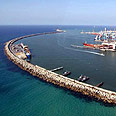
The Histadrut Labor Federation declared a labor dispute in the Israeli ports on Tuesday. The dispute, which includes the Haifa, Ashdod and Eilat ports, was called after the government's newly inducted Arrangements Act declared that Israel Ports – which managers the harbors' properties – will be taking over the administrative operations of the ports as well.
The Histadrut claims that having Israel Ports as the de facto manager of all aspects pertaining to the ports' daily operations, will destabilize the current working relations in the ports, by introducing part-time workers at the expense of the regular staff.
Avi Edri, Chairman of the Histadrut's Transportation Workers' Union, said that according to the contracts signed in 2005, during the ports' administrative reconfiguration, all harbor personnel are considered the respective ports' employees. The government, he added, wants to introduce an external maintenance company, which will have no employer-employee relations with the current personnel.
What the government and the Finance Ministry are essentially trying to do, added Edri, is to undermine the current working relations' equilibrium, which the Histadrut labor federation and the ports have spent years cultivating, in the name of competitiveness.
"They're (the Treasury) trying to force an undesirable (operational) model on the ports. One has to wonder why."
Traffic jam at sea
The ports' unions are expected to hold an emergency meeting in all three ports on Thursday, to discuss future steps. The ports are already operating in 50% capacity, and may drop to 30% as the crisis continues.
Industry experts assess that the situation may soon escalate to a full-blown strike.
Sources in Haifa Port said that the unloading of the boats currently docking in the port may take up to five days, and that within two days, a "'traffic jam" may be formed.
Gabi Ben-Harush, chairman of the Transport Board and Reuven Zuk, head of the Israeli Chamber of Shipping, are said to have met in an attempt to circumvent the possible congestion. Ben-Harush suggested ordering his trucks to stay away from the ports, while Zuk redirects ships from the blocked Israeli ports to neighboring countries for unloading.
Zuk, on his part, said taking any such action may be redundant, since many of the international shipping companies have already informed him that should the strike erupt they will redirect their ships elsewhere.
Gad Sheffer, head of the Israel Shippers' Council said that in his opinion, "the government made a terrible mistake in the way it tried to handle the entire thing… we're not facing congestion just yet, but with holiday shipments scheduled to arrive, we can certainly feel the pressure."
Multi-million dollar losses
A possible strike in Israel's ports may have detrimental affects on pre-holiday and holiday retail sales, as dozens of containers carrying various good to local chain stores may be indefinitely detained. Industry experts told Yedioth Ahronoth that should a strike erupt, it may cause a loss of up to $50 million a day to the Israeli economy.
The Federation of Israeli Chambers of Commerce's shipping and transport council held an emergency meeting to discuss the labor dispute, and urged the Histadrut and the Finance Ministry to begin negotiations in an effort to solve the crisis. The committee also urged the Histadrut to order all harbor personnel to return to work immediately, "in order to minimize the harm done to Israel's ports."
The Finance Ministry offered the following comment: "The government's decision, which was supported by the Transportation Ministry and the Treasury, does not harm the 2005 reconfiguration agreement signed with the workers in any way.
"Following a request made by the Histadrut about a week prior to the government voting on the changes, we offered to hold a meeting in which the amendments would be discussed at length. The Histadrut's representatives refused… and to this day we have yet to be notified just what are the changes it finds harmful to the workers.
"The Histadrut's decision to declare a labor dispute in the ports is borderline irresponsible in respect to the public sector, and seems to be riddled with more than just professional considerations."
Navit Zomer and David Regev contributed to this report















